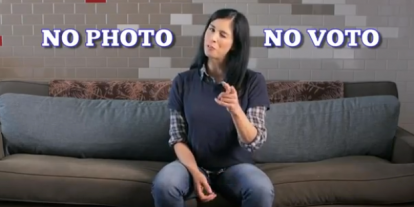UPDATE: TERRY MCAULIFFE’S VICTORY YESTERDAY IN THE VIRGINIA GOVERNOR’S RACE ATTRIBUTED TO THE OVERWHELMING WOMEN’S VOTE.
EFFORTS TO RESTRICT THE WOMEN’S VOTE HAVE A SUDDEN NEW PURPOSE.
———————————————
We always knew they didn’t like us women voting but now it’s clear.
Voter suppression is threatening us at the polls – and spreading legislature to legislature across the country. You better be paying attention.
In Missouri, we fully expect the GOP to put Voter ID on the ballot in November 2014 (will go straight from the GOP-controlled legislature to the ballot, no stops in between). They’ve been trying for 9 years and plan to get it done this time.
Why, you ask?
If they can’t win legitimately because of those “Pesky Women” who vote overwhelmingly Democratic, then hurdles like making women document their names is part of their game plan.
What happens in Texas, doesn’t stay in Texas anymore. Listen up ladies: Don’t Be Silenced!
—————————————————————————
Editorial: Voter ID laws disenfranchise women
St. Louis Post Dispatch Editorial Board – November 4, 2013
Republican attempts to use voter identification laws to suppress voting by people more likely to vote for Democrats has created a class of victims it probably was not intended for.
Women. Even Republican women.
The GOP has tried to thinly veil its efforts by claiming that voter ID laws are necessary to prevent voter fraud, but the figures on voter fraud — which is almost nil everywhere — show that to be a phony excuse.
The real reason is to make voting more difficult for blacks, Hispanics, the young, the elderly and the poor, who traditionally tend to vote for Democrats.
After the U.S. Supreme Court struck down a key part of the Voting Rights Act in June, several states raced to put new voter ID laws into effect. Attention initially focused on the way such laws affected African-Americans and Hispanics.
Now the focus of concern is on women. To quote the governor of Texas, a state that’s making harder for women to vote, “Oops.”
Women who are married or divorced will find it more difficult to cast a ballot in upcoming elections in Texas and nine other states: Alabama, Georgia, Indiana, Kansas, Mississippi, Pennsylvania, South Carolina, Tennessee and Wisconsin. These states require specific types of government-issued photo identification that women, in particular, may find difficult to obtain.
The reason is that nearly 90 percent of women change their names when they get married or divorced and frequently wind up with discrepancies between their names on various pieces of identification necessary to get a government-issued voter photo ID.
A 2006 survey, the most recent available, by the Brennan Center for Justice shows that 34 percent of voting-age women do not possess a proof-of-citizenship document that reflects their legal name. Add to this a divorce rate of 40 percent to 50 percent, and it’s easy to see that a lot of women could have a problem at the polls.
Another problem exists in states that are requiring matches of names on voter registration logs and on other forms of identification, such as state ID cards, driver’s licenses, passports and Social Security cards.
Take the new Texas voter ID laws for example. In that state, with its 13,594,264 registered voters, the highest number in state history, people who go to the polls must present government-issued photo IDs to be allowed to vote. In addition, poll workers must check these IDs against an official voting registry to determine if the two names “substantially” match.
So a woman who may have updated her voter registration after she got married, but not her driver’s license or passport, could be denied the right to vote. Legally, but wrongly.
The issue will be familiar to women. The debate about keeping maiden names (or “birth names,” as some would have it) began in the 1850s, when feminist philosophy and the suffragette movement first swept across the United States. It got serious attention with the rise of the feminist movement in the 1960s.
This has led to a plethora of permutations. Some women hyphenate; some keep their maiden names as their middle names; some use one name professionally and another in their private lives; some change their names on certain pieces of identification but not on others. The list goes on.
An interesting side note to this is that only 10 states allow men to change their last names when they get married. Information on how many men want to change their last names was unavailable.
Judith Browne Dianis, co-director of a civil rights organization called the Advancement Project, said: “We need Americans to understand that even though this particular ‘war on women’ isn’t out in the light, women are quietly being disenfranchised in the dark — they just might not know it yet.”
All Americans who believe in our democracy need to fight against these discriminatory voting laws. But while they are in place, women need to make sure they have the identification necessary to vote.
Women constitute 51 percent of registered voters and vote in greater numbers than men. In presidential elections, they tend to vote heavily Democratic. Maybe this latest voter suppression is not an “oops” thing after all.
Women have overcome a lot of hurdles. They must not let their voices be quieted by this latest one.

